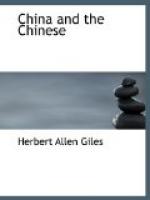“Following our own bent,
Let us enjoy the Natural, free from
curb,
Rich with what comes to hand,
Hoping some day to be with the Infinite.
To build a hut beneath the pines,
With uncovered head to pore over
poetry,
Knowing only morning and eve,
But not what season it may be ...
Then, if happiness is ours
Why must there be Action?
If of our own selves we can reach
this point,
Can we not be said to have attained?”
Utterances of this kind are responsible for the lives of many Taoist hermits who from time to time have withdrawn from the world, devoting themselves to the pursuit of true happiness, on the mountains.
“After gazing abstractedly upon
expression and substance,
The mind returns with a spiritual
image,
As when seeking the outlines of
waves,
As when painting the glory of spring.
The changing shapes of wind-swept
clouds,
The energies of flowers and plants,
The rolling breakers of ocean,
The crags and cliffs of mountains,
All these are like mighty TAO,
Skilfully woven into earthly surroundings
...
To obtain likeness without form
Is not that to possess the man?”
This stanza means that man should become like the contour of waves, like the glory of spring,—something which to a beholder is a mental image, without constant physical form or substance. Then motion supervenes; not motion as we know it, but a transcendental state of revolution in the Infinite. This is the subject of stanza xxiv:—
“Like a whirling water-wheel,
Like rolling pearls,—
Yet how are these worthy to be named?
They are but adaptations for fools.
There is the mighty axis of Earth,
The never resting pole of Heaven;
Let us grasp their clue,
And with them be blended
in One,
Beyond the bounds of thought,
Circling for ever in the great Void,
An orbit of a thousand years,—
Yes, this is the key to my theme.”
All that might be dignified by the name of pure Taoism ends here. From this point the descent to lower regions is both easy and rapid.
I am not speaking now in a chronological sense, but of the highest intellectual point reached by the doctrines of Taoism, which began to decline long before the writer of this poem, himself a pure Taoist of the tenth century, was born.
The idea mentioned above, that the grosser elements of man’s nature might be refined away and immortality attained, seems to have suggested an immortality, not merely in an unseen world, but even in this one, to be secured by an imaginary elixir of life. Certain at any rate it is, that so far back as a century or so before the Christian era, the desire to discover this elixir had become a national craze.
The following story is historical, and dates from about 200 B.C.:—




